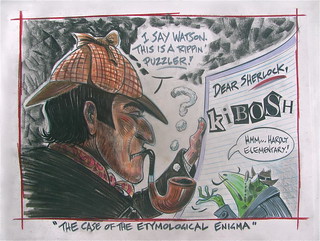|
Home
|
AWADmail Issue 765A Weekly Compendium of Feedback on the Words in A.Word.A.Day and Tidbits about Words and LanguageSponsor’s Message: Congrats to the Email of the Week winner, Richard Alexander (see below), who’ll receive our acclaimed One Up! -- The Wicked/Smart Word Game, a quick, canny, and sometimes unfun hoot. Competitive smart alecks may want to check out our latest blog post, “Algae are Scum!” -- which asks the provocative question: Are you smarter than an amoeba?
From: Chris Handley (chris redheron.com) The most likely explanation is that they have been given new histories as part of the Word Protection Program (just like humans in the Witness Protection Program).
Chris Handley, Dunedin, New Zealand
From: Anu Garg (words at wordsmith.org) Lots of readers sent lots of theories about possible origins of this week’s words. Some were very confident, others not so. Irrespective of the confidence level of the sender, we have to continue saying “origin unknown” about each of these words until we have corroborating evidence. It’s not as if we are playing a president on TV (video, 1 min.). Thanks for taking the time to send the stories you have come across. Here’s a selection.
Kibush means victory in Hebrew. I don’t think this origin is unknown at
all. It is 100% Hebrew, which comes to us via Yiddish.
There is a variety of very large, hard squash known as a calabosh. In
India, for example, one finds these squashes hollowed out, dried, and
ornately etched upon to create a decorative bowl. One can only imagine that
dropping a fresh calabosh on someone’s head to stop them would definitely
do the trick, if not worse. Thus “kibosh”, spelled as it is pronounced,
is a corruption of “calabosh”. Maybe? Home-brewed theories like this one
are a little too facile to take at face value, so I hold it in abeyance.
In the British criminal justice system, which prevailed in Ireland until
independence, before pronouncing a death sentence, judges would place
a black cap on top of their wigs, a practice which continued in Britain
until abolition of the death penalty. In Gaelic, this cap was known as
“caip bais” (with an accent on the second “a”). This is pronounced “kipe
baw-ish” and is the most likely origin.
I have wondered if kibosh was an intensified version of “cosh”, that
being the proper Victorian thug’s stealthy tool with which to knock out
one’s lights. The thing we here in America call a blackjack. I can’t find
any origins for cosh, only that it appears in mid-19th century England,
similar to kibosh in that regard. A cosh delivering a bash could perhaps
become a kibosh in the way that “total” was intensified to “Tee-total”
among the abstinence crowd.
I think in ancient Ireland the ki-bosh was a tall crown-like headpiece
that was very heavy. It may have kept someone from doing something to wear
such a heavy hat? No surety, but a clue for you to explore?
Calabash? As in witch doctor, to do with spells, curses, wand. No authority,
but this could be closer than the rest and possibly derived from Christian
missionary work in Africa pre-C20, or Allied armed forces in N Africa. Touch
of Cockney slang in its adoption. My late father who served in N Africa
during World War 2 used it frequently.
I was told that years ago Orthodox Jews, who were forbidden from cooking
or housework on the Sabbath, often hired African Americans to do these
things, and when the woman of the house was asked whether the table was
set correctly she said col b’seder, which is Hebrew for “everything is
in order,” and this phrase was taken up by jazz musicians to describe a
combo that was, so to speak, “in the groove.”
If com- (with, together) and pac- (peace), then maybe it was coined,
jocularly, to denote something we were collectively at peace with, something
we could live with. Just a thought.
I am continuing to try to learn German and I see occasional possibilities
in word origins. For example, with copacetic, if you were to use the German
“Opas Ethik” meaning “grandfather’s ethics”, one could possibly imagine
that this was a Yiddish phrase. It would be pronounced as copacetic without
the leading c.
I was surprised that the writers today did not mention the theory that
“copacetic” came from Chinook jargon of the Pacific Northwest. I grew up
in Washington state, and the word is used a lot in my family (although we
are not Native Americans); it was my father who told me that it came from a
Chinook word (he grew up there, as did his parents and grandparents). Since
my early years in Washington, I’ve lived in many other places (the UK,
France, New Mexico, Colorado), and my sense is that “copacetic” does not
seem to be used with as much frequency as it is in the Pacific Northwest.
Not sure about the origin, but the term was made popular by the tap
dancer/performer Bill “Bojangles” Robinson.
The story I have is that there was a brewery just down from Billingsgate
Fish Market in London that
used to use water (at times) from runoff from the market. Such water
would have an amount of fish offal, scales, and other nutritional detritus
that would add hugely to the S.G. or potency (alcoholic content) of the
beer. Drinking that beer would get the drinker drunker, faster than usual -
so he “benefited” from the cod’s wallop.
I always thought (although I have no evidence to prove it) that codswallop
was a variation on cow’s dung.
It’s hard to believe that H.L. Mencken did NOT coin the term codswallop. It
sounds so like him, but I haven’t found evidence for that (yet).
I’m more inclined that it evolved from some obscure reference to being
walloped in the cods.
I thought everybody knew that in order to open a bottle of Codd’s beer
(with the marble in the neck) you needed to wallop it upside down on the
table to dislodge the marble. And, what goes down in the pub is nonsense,
and might as well be codswallop.
In the days of the dory fishermen (think “Captains Courageous”), when the
cod were handlined aboard the dory, the sudden change in pressure would
cause the fish to disgorge everything they had eaten recently. In a
few minutes of fishing, the boat would be awash in a noisome mess of
disgorged krill and other such. The fishermen called it “cod swallow”
which morphed into “codswallop”.
Codswallop = a Monty Python skit where Palin and Cleese are engaged in
the martial art of fish slapping and it was hilarious!
The term lollygag was originally used to describe the act of French kissing.
“Lollygag” brings to mind the image of one closely focused on the lollypop in
hand to the exclusion of anything else. In Britain, it’s simply a “lolly”,
BTW. In the extreme, one might enjoy one’s lolly to the point of gagging
on it.
From: Allen Thomson (thomsona flash.net) Well, this is weird. Yesterday we drove from Panama City to El Valle de Antión and on the way went through a microtown called Copecito (8.514 N, 80.036 W). I idly thought that it sounded like copacetic and lo, this morning’s WOTD is copacetic. Jungian synchronicity at its finest!
Allen Thomson, San Antonio, Texas
From: Jerry Kaufman (j.cowfm gmail.com) I knew a number of people when I was young who used this word. Often it was in the form of a short, even one word question. There was also a response by inverting the word:
A: Copacetic? Translation: “You OK?” “Yup.” Mostly interacted with older African Americans when using this word.
Jerry Kaufman, Monroe Township, New Jersey
From: Hugh Hyatt (hugh.hyatt gmail.com)
A THOUGHT FOR TODAY: And the day came when the risk it took to remain tight inside the bud was more painful than the risk it took to blossom. -Anais Nin, writer (21 Feb 1903-1977) The actual, correct quotation is, “And the day came when the risk to remain closed in a bud became more painful than the risk it took to blossom,” and, should be attributed to Elizabeth Appell.
Hugh D. Hyatt, Upper Holland, Pennsylvania
We’ve updated it on the website. Thank you.
-Anu Garg
From: Norma Meyer (nsophm gmail.com)
A THOUGHT FOR TODAY: Roads endure longer than pyramids. -Karol Bunsch, novelist (22 Feb 1898-1987) Karol Buntsch obviously doesn’t live in St. Clair County, MI
Norma Meyer, East China, Michigan
From: Richard Alexander (alexander triton.net) For me, and probably for thousands (millions?) of others, “lollygag” shall forever be associated with the movie Bull Durham. The team’s manager (“Skip”) was played by the wonderful character actor Trey Wilson, who died seven months after the movie was released, five days shy of his 41st birthday.
Skip: You guys. You lollygag the ball around the infield. You lollygag
your way down to first. You lollygag in and out of the dugout. You know
what that makes you? Larry!
Richard Alexander, Grand Rapids, Michigan
From: Alex McCrae (ajmccrae277 gmail.com) Sir Conan Doyle’s intrepid, much-beloved super-sleuth Sherlock Holmes never met a case he didn’t relish... and ultimately solve. But this cryptic “kibosh” message clearly has him momentarily flummoxed, with his trusted partner, an equally perplexed Watson, offering little consolation. After roughly a month in office, Trump has often managed to play fast-and-loose with the truth; what his slippery, sycophantic senior advisor Kellyanne Conway has now euphemistically parsed as “alternative facts”. Some might be a tad less generous than advisor Conway’s assessment in this regard, deeming much of Trump’s S-T-R-E-T-C-H-E-D, farfetched pronouncements as just plain Grade-”A”-prime codswallop.
Alex McCrae, Van Nuys, California
From: Anu Garg (words at wordsmith.org)
From: Anu Garg (words at wordsmith.org)
Six beers. He appears pretty sloshed.
“If on Jesus you put the kibosh,”
If you’re feeling not quite up to par
If based on attraction magnetic,
On the flute John was quite copacetic
“You Kennedy boys are rambunctious!”
I’ve fallen in love with fake news.
Denouncing the news as codswallop,
The professor, a bit of a drag,
From: Phil Graham (pgraham1946 cox.net) Having watched golfer Laffoon make triple-bogey, the drunk said, “Didja see Kybosh that hole?” The novitiates were warned, “If you can’t cope ascetic lifestyles aren’t for you.” Reading an article on male superiority, the ewe said, “This rambunctious makes me sick!” Riding bareback makes my codswallop. Lolita drank some castor oil. It made lollygag.
Phil Graham, Tulsa, Oklahoma
A THOUGHT FOR TODAY:
Men hate those to whom they have to lie. -Victor Hugo, poet, novelist, and
dramatist (26 Feb 1802-1885)
|
|
Awards | Stats | Links | Privacy Policy
Contribute | Advertise
© 1994-2026 Wordsmith

